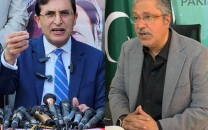Contestations over domestic violence
Why is the women protection bill still facing such vehement opposition from the religious right wing?

The writer works at the Lahore desk of The Express Tribune
With its revolutionary kernel out of the way, why is the law still facing such vehement opposition from the religious right wing?
The religious right wing’s opposition to the law is rooted in its withdrawal to managing affairs in the private domains of self and family with the emergence of modern state institutions in late 19th century British India. Submitting to the colonial modernity in the public domains of politics and economy, the Islamic revivalists like the Deoband and Barelvi reformers had assumed for themselves the task of governing the (Muslim) self by setting standards for moral behaviour, personal relations and ritual performances and the (Muslim) community through an Islamic education in Quranic exegesis, hadith studies and Islamic jurisprudence.
Nonetheless, the religious right-wing is not a monolith, and there is considerable difference of opinion in it over how to govern these domains. For instance, parties at the Mansoora convention on March 15 had demanded an outright withdrawal of the law, but the position of clerics on a committee formed by the provincial government to address concerns over the law is less extreme: they seem fine with the law if their concerns are addressed. Another important right-wing viewpoint is that of the new-age televangelists, who have supported the law.
This diversity of opinion, within the religious right, can be traced to the fragmentation of religious authority brought about by the introduction in British India of a system of secular education. The modernist and Islamist intellectual challenges to the traditionalist clergy’s monopoly over the governance of the self and the family, were a product of this education. Those who got together at Mansoora, then, were just some fragments in this broad spectrum of (religious right-wing) opinion. They have amassed great organisational and financial resources, enabling them to pressure state institutions into listening to their voices. The provincial government’s committee members represent the segment that has made inroads into state institutions through organisations, such as the Pakistan Ulema Council, institutions like the Council of Islamic Ideology and the Federal Shariat Courts and governing bodies like the Auqaf Departments.
The only common denominator that links these segments together is the religious right wing’s grand failure in providing any vision for governance in the domains of politics and economy in the modern era, let alone rallying the public in support of such a vision.
Like their colonial predecessors, the post-colonial state institutions in Pakistan have relied on the Global North for both financial and ideological impetus to manage affairs in these domains. This means that it isn’t just the money from the international, financial and development institutes and donor agencies that the Pakistani state has needed to keep balancing its books. The state has also relied on the knowledge generated in secular academia, to provide it a vision for regulating politics and the economy (the Punjab Growth Strategy 2018 is an example of this vision).
The organised support for the law comes from multiple sources but its core is the network of non-governmental organisations (NGOs) that work for promotion of women’s rights and gender justice. It is to the credit of these NGOs and their allies in the women’s wings of the parliamentary parties and the international donor community that we have the much-needed law enacted in the first place. The NGO model of activism is centered on lobbying and advocacy efforts and works through, rather than against, existing social structures. Similar to the post-colonial state institutions, the NGOs also rely on donor agencies based in the Global North and on secular academia for the material and ideological basis for their work.
Now, the extent to which the state institutions may yield to the opponents or the supporters of the law will be determined primarily by the exigencies of governing the public domains of politics and the economy. Following Michel Foucault’s study of neo-liberal governmentality in Western Europe, one should bear in mind that the modern state is concerned, first and foremost, with governance in these domains. And, it is the affairs in these domains that determine a state’s policy vis-à-vis the private domains of individual self and family.
So far, the state has kept intact its partnership with the religious right wing in governing the latter domains. However, the terms of this partnership have not remained fixed in time. These have evolved in relation to the state’s needs in the public domains. Consider the cases of General Ayub and General Zia’s regimes. The former pulled off a modern set of family laws in 1961, despite vehement opposition from the clerical segments of the religious right wing. The latter oversaw the enactment of a regressive and misogynist legal regime, in the form of Hudood laws, in cahoots with these segments. Yet, both had relied on the Global North for material and ideological basis for managing the polity and the economy. Barring the Bhutto administration’s experimentation with Islamic socialism, this reliance on the Global North has arguably been a feature of all governments in the country’s political history since 1947. The Sharif administration is merely following this already established trend and is likely to accommodate the religious right wing’s demands over the domestic violence legislation only to the extent that is viable with its political and economic ambitions. This combination of accommodating the religious right and relying on the Global North, will ensure that the law will stay, but is sanitised of all revolutionary possibilities and poses absolutely no threat to the institution of the patriarchal family — a trajectory already evident in the decision to include family members in the DWPC proceedings.
Published in The Express Tribune, April 6th, 2016.
Like Opinion & Editorial on Facebook, follow @ETOpEd on Twitter to receive all updates on all our daily pieces.














COMMENTS
Comments are moderated and generally will be posted if they are on-topic and not abusive.
For more information, please see our Comments FAQ